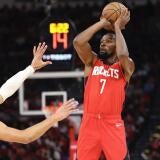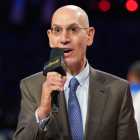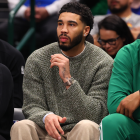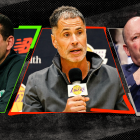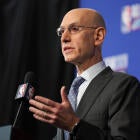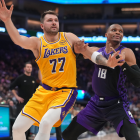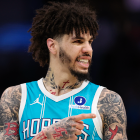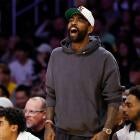Heat dissolve as Thunder power through to Game 1 Finals win
The Oklahoma City Thunder pushed past the Miami Heat in the second half of Game 1 of the 2012 NBA Finals as Miami's role players fizzled down the stretch.
By
Ben Golliver
•
5 min read
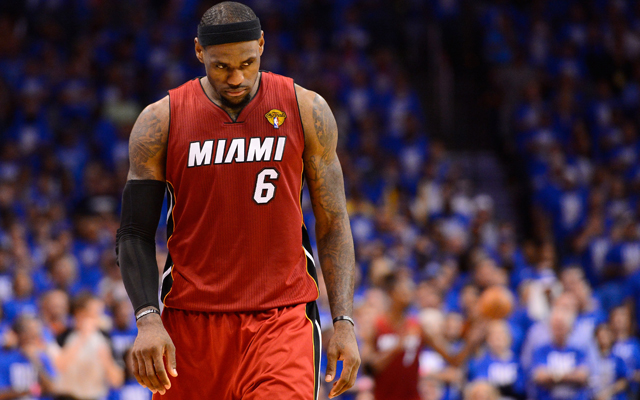 |
| LeBron James found himself doing all of the work again in Game 1 of the 2012 NBA Finals. (Getty Images) |
OKLAHOMA CITY -- When you only play six guys real minutes, they need to be able to play.
That's the dilemma facing the Miami Heat as they assess a 105-94 loss to the Oklahoma City Thunder in Game 1 of the 2012 NBA Finals at Chesapeake Energy Arena.
As advertised, Oklahoma City showed on Tuesday night that it is a deep, talented and versatile team, one capable of going big or small, capable of getting good looks in transition or in the halfcourt, capable of playing steadily from behind or with a lead.
"That's what they do," Heat coach Erik Spoelstra said. "They keep coming. They're relentless. They beat us at their game."
In NBA Finals history, the winner of Game 1 has gone on to win the series 47 times and lose the series 18 times. For a half, Miami was well-positioned to steal a crucial road win. The key was Heat forward Shane Battier, who scored 14 of his postseason high 17 points in the first half, including three first quarter 3-pointers.
| More on NBA Finals, Game 1 |
| Analysis |
  |
| Video |
| More NBA coverage |
|
"We moved the ball and Shane was the recipient," Heat forward LeBron James, who finished with a team-high 30 points, said. "He knocked down a lot of shots and he helped us to spread the floor. He's a big part of our unit and when he knocks down shots we're a very, very good team."
It wasn't just Battier. The Heat passed the ball around the perimeter with great pace and purpose, finding open shooters and hitting six of their 10 three point attempts. In the first half, the Heat registered 14 assists on 22 field goals and got 34 of their 54 points from players not named LeBron James and Dwyane Wade.
That all added up to a solid 7-point halftime lead. Unfortunately, hopes were dashed as quickly as they were raised. In the second half, just six of Miami's 14 field goals were assisted and the James/Wade duo combined for 29 of Miami's 40 points. The previously precise ball movement disappeared and the hot perimeter shooting disappeared in turn, as the Heat shot just 2-for-9 from deep in the second half.
"We didn't attack as much in the second half," Spoelstra admitted.
The Thunder simply dominated the game's late stretches, with All-Star forward Kevin Durant scoring 17 fourth quarter points by himself (on 10 shots) as the Heat managed just 21 as a team (on 17 shots). Durant finished with a game-high 36 points and easily carried the day with the game on the line.
One major factor late: Oklahoma City went eight players deep in its rotation while Miami played just six players for more than 10 minutes. Thunder center Nick Collison was big, making energy plays but also finishing offensive possesions at the rim on his way to eight points and 10 rebounds. Derek Fisher and James Harden were bit players but both were competent, more than can be said for their little-used Miami counterparts. Their combined presence and energy made it that much easier for Durant to find his open looks and to dissect Miami's weary defense at will.
Spoelstra and James both agreed after the game that perhaps the Heat would need to use more of its reserves if it was going to be able to keep up with the Thunder.
"We know we have to have more [bench] production for sure," he said. "We're going to have to have more guys in there to give me and [Dwyane] Wade a rest. And Shane [Battier]. Shane played a lot of minutes. But [coach Erik Spoelstra] will figure that out. We'll be more conscious about it, just trying to get a minute or two here or there so we can finish strong."
Spoelstra, in turn, was oblique regarding his rotation, insinuating that perhaps someone was not available to him, either due to injury or some other explanation.
"Because of the circumstances, I had to shorten the rotation, but I'll probably make that change and find out who will be available in the next game," he said.
Later, when pressed on what "circumstances" meant, Spoelstra dodged: "The next game I'll be able to go a little deeper. Again, in this first game we were trying to keep [the rotation] tight. But I think we'll have a day of rest, guys will be ready to go on Thursday."
Whether they have mysterious reinforcements available or not doesn't matter all that much. The Heat can talk about increasing their bench production all they want but it's never been there for them on a consistent basis during the playoffs. Cracks started to show when Chris Bosh went down with an injury against the Indiana Pacers and they nearly proved fatal against the Boston Celtics in the Eastern Conference finals. The Heat simply lack talented big bodies that would be useful in match-up situations and their perimeter reserves don't defend all that well and haven't shot the ball reliably enough to make up for those deficiencies.
In the two previous series, Miami's stars emerged to carry the day. That will be their burden again in this one. The role players can do more but they can't do enough here. James plays A+ basketball, Wade (who finished with just 19 points) gets back to playing like a real superstar and Bosh becomes a major X-factor like he was against the Celtics in Game 7, or the tight-knit, focused and confident Thunder goes home as champions.
"Well, this one is behind us now," Spoelstra said in opening his post-game comments.
Sure, one loss is now in the past. But the depth and consistency questions remain firmly in the present and short-term future. It's not too much to say -- even after just one game -- that they loom as Miami's potential downfall.





